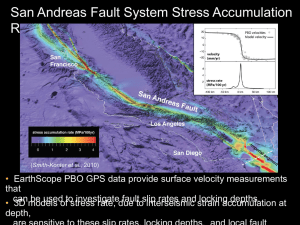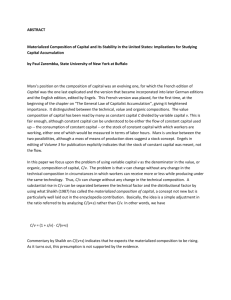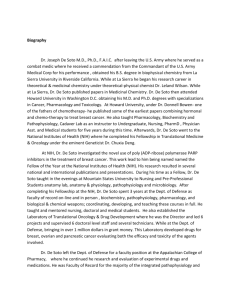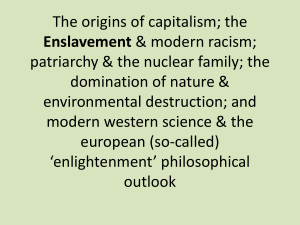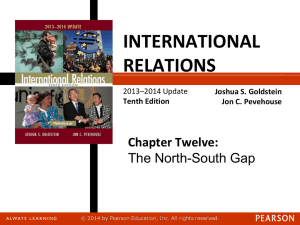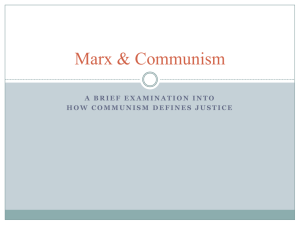What is the Relationship of Law to Economic Development?
advertisement
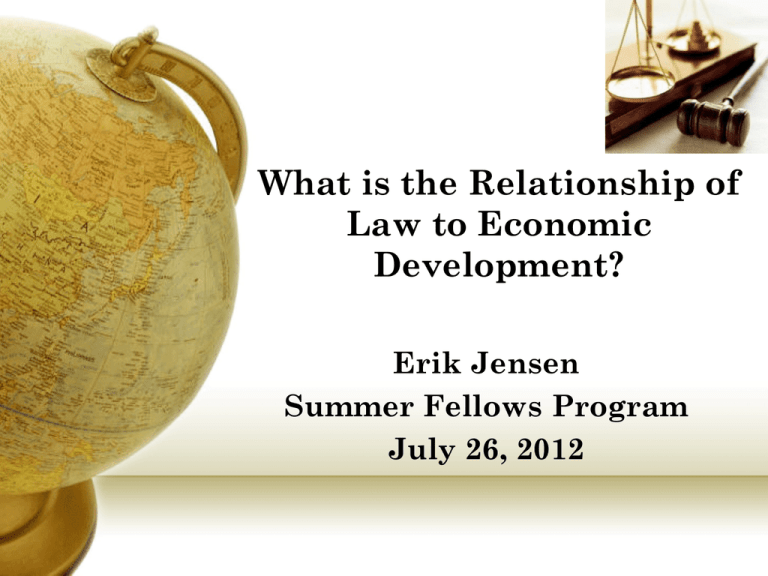
What is the Relationship of Law to Economic Development? Erik Jensen Summer Fellows Program July 26, 2012 Remember - What “Goods” Does Rule of Law Deliver? • • • • • Citizen security and stability Dispute resolution Economic growth and development Human rights protection Protection from governmental caprice and corruption Causality? 4/9/2015 2 Three Questions 1. Is ROL Dependent on Regime Type? 2. How Does Law Develop? 3. Is Law/Legal Institutions a Leading or Lagging Indicator in Economic Development? 4/9/2015 3 Remember My Contention: ROL =/= Pregnancy Rule of law is not like pregnancy, you don’t either have it or not Matters of degree with pockets of performance Pakistan Singapore Cambodia China 4/9/2015 4 1. Is Regime Change Necessary to Achieve ROL? Five States of Legality a. Anarchy Breakdown of indigenous social structures b. Despotic Rule Argentina 1976-79 where internal secret military police played a prominent role in governancea 4/9/2015 5 Rule by law c. “Rule by Law” • The use of law as in instrument of domination. • Authoritarian and oppressive • “To my friends everything, to my enemies the law.” 4/9/2015 6 Rechtsstaat d. Rechtsstaat emphasizes law and order (a) all state authority governed by law (b) reason-based codification administered by civil service (c) evenly applied and adjudicable Trying to fit the messy phenomena of life into a Code. (Casper) 4/9/2015 7 Democratic rule of law e. Democratic rule of law (a)upholds political rights; limits state actors (e.g., freedom of the press, free and fair elections) (b) upholds civil rights, and 4/9/2015 (c) holds all officials, high and low, accountable 8 2. How Does Law Develop? Jerry Rosenberg, Hollow Hope: Can Courts Bring About Social Change (1991) -> Michael Klarman -> Pam Karlan Law changes [or is upheld] when patterns of demands and expectations change Demand for law and legal institutions increases as economies grow ( Marx, Smith) 4/9/2015 9 Law’s Connectedness Depends On … Law is potentially connected to and shaped by every aspect of society, economy and polity. • History, tradition and culture • Political and economic system • Distribution of wealth and power • Degree of industrialization • Mediation of ethnic, language and religious differences • Power dynamics among elites in society (particularly influential) 4/9/2015 10 3. Is Law a Leading or Lagging Indicator in Economic Development? Underlying Assumptions That a well-functioning judiciary is necessary for economic growth and development That “substitutes” for a well functioning judiciary entail high transaction costs (unpredictability, enforcement costs) 4/9/2015 11 Legal Substitutes for Formal Processes Relationships (clans, tribes) Good faith/repeat dealings Abundant information Guilds, associations, codes of conduct Private security 4/9/2015 12 The Assertion Legal Institutions and Judicial Enforcement Are Necessary to Move From a Traditional Economy (Economy of the Bazaar) to a Developed Economy “Missing in the suq (bazaar economies engaged in regional trade) are the fundamental underpinnings of legal institutions and judicial enforcement that would make such voluntary organizations viable and profitable. In their absence, there is no incentive to alter the system.” Doug North, Institutions, Institutional Change and Economic Performance (1991), p. 124. Primitive Accumulation Smith: “Previous Accumulation” “The accumulation of stock must, in the nature of things, be previous to the division of labour" (Smith 1776, II.3, p. 277). Marx: “Primitive Accumulation” – the separation of people from their means of production (expropriation, enslavement, etc.) "Primitive accumulation plays approximately the same role in political economy as original sin does in theology" (Marx 1977, p. 873) Marx’s “primitive accumulation” is the rule, not the exception Legal Institutions and Economic Growth The vast weight of evidence in critical earlier stages of economic development: (a) That a well functioning judiciary is not needed for dynamic economic growth (b) That law is not necessarily “better” (costeffective) than “legal substitutes” as a device to govern economic activity 4/9/2015 16 China and India Problem India: 2007 WB ranked India 173 out of 175 countries in contract enforcement – only Bangladesh and Timor Leste faired worse (2008 WB India 177 out of 178) China: 9% growth over 25 years with highly underdeveloped legal system, poor corporate governance, relatively small capital market 4/9/2015 17 Weber Redux “Nonlegal” factors are important Custom and convention difficult to change 4/9/2015 18 Differing Views THE OTHER PATH, Hernando De Soto claims that: “The legal system may be the main explanation in the difference in development that exists between industrialized countries and those that are not industrialized.” “Development is possible only if efficient legal institutions are available to all citizens.” “The law is the most useful and deliberate instrument of change available to people.” 4/9/2015 19 Differing Views East Asia Miracle pays no attention to legal system Doug North’s Institutions, Institutional Change and Economic Performance asserts importance 4/9/2015 20 Differing Views Causal Arrows • Do property rights and enforcement of contracts cause economic growth? • Or, does economic growth lead to the need for greater respect for property rights and contracts and better performance of legal institutions? • Where is the tipping point when demand for law and legal institutions becomes more pervasive? 4/9/2015 21 Property Rights and De Soto “What the poor lack is easy access to the property mechanisms that could legally fix the economic potential of their assets so that they could be used to produce, secure, or guarantee greater value in the expanded market.” Hernando de Soto, The Mystery of Capital (2001). 4/9/2015 22 But is it that simple? The “De Soto Effect” If there is extreme poverty and little competition, increasing property rights registration can lead to greater exploitation in the credit market because lenders can foreclose on defaulting borrowers more easily, without any efficiency gains. If the state is unwilling to act to constrain lender’s market power, then property registration is not a win-win for borrowers and lenders. Tim Besley and Matreesh Ghatak, “The de Soto Effect” (April 2009) 4/9/2015 23 Is it that simple? Jensen et al research on slums Jakarta – relocation of slum-dwellers Confusion about “justice” and property rights – who’s justice, when and how? Naga City example 4/9/2015 24 Property Rights and Many Paths [W]hen investors believe their property rights are protected, the economy ends up richer. But nothing is implied about the actual form that property rights should take. We cannot even necessarily deduce that enacting a private property rights regime would produce superior results compared to alternative forms of property rights…. Rodrik, One Economics, Many Recipies: Globalization, Institutions and Economic Growth (2007) 4/9/2015 25 Positive Law and Economic Growth LLSV study found through elaborate cross country regressions in forty-nine developed and developing countries that common law countries grew faster than civil law countries. BUT “Startling result” contrary to the key finding/bias of their study that the origins and content of positive law explain economic performance: 4/9/2015 26 Positive Law and Economic Growth The poorest one-third of countries have better substantive law than the richest one-third by the LLSV authors’ own definition of the crucial substantive rules! Also, see Germany and France vs. UK And see Tunisia, Morocco and Algeria vs. most of sub-Saharan African common law countries 4/9/2015 27 Working Hypothesis EVIDENCE Available empirical evidence: best working hypothesis is that there are on-again-offagain connections between law, legal institutions and economic growth and development. 4/9/2015 28 Reasons for on-again-off-again connections A) Larger issue: Growing evidence that desirable institutional arrangements have a large element of context specificity, arising from: • • • • 4/9/2015 differences in historical trajectories geography political economy or other initial conditions… 29 Reasons for on-again-off-again connections B) Legal substitutes for formal legal processes: - relationships (clans, tribes) - good faith dealings (repeat dealings) - abundant information - guilds, vol. assoc., codes of conduct - private security 4/9/2015 30 Reasons for on-again-off-again connections C) Common Business Practice Data provide inconsistent evidence on the importance of formal laws and legal institutions to economic development because the measurements fail to account for common business practice. 4/9/2015 31 Risk and Economic Growth FDI, for example, at least six types of risk are possible: (1) commercial risk (e.g., fluctuating markets) (2) political risk (e.g., expropriation) (3) legal risk (e.g., unpredictable courts) 4/9/2015 32 Risk and Economic Growth (4) regulatory risk from administrative action (capricious rule or decision-making) (5) security risk (crime) (6) social risk (civil society action against or for certain types of investment) 4/9/2015 33 “Legal Risk” and Investors on-the-Ground Important data point: Fewer than half of firms in almost all transition countries surveyed in 2002 believed that courts were able to enforce their decisions. 4/9/2015 34 Investors on the Ground Alternative hypotheses - investing despite a poorly functioning legal system: (1) Investors are not aware of the potential damage that an inefficient or unpredictable legal system can cause to their investment (2) Legal systems that deviate from the “ideal” may nonetheless offer efficiency and/or predictability (3) Investors are aware of potential damage, but view legal system as modest factor in risk assessment 4/9/2015 35 What Comes First? Order, Stability and Economic Growth How much security is needed? Level of “legal security” needed is variable. And how you achieve security varies (e.g., cell phone towers in Afghanistan) Level of sunk cost: power generating plant vs. stitching factory 4/9/2015 36 What Comes First? ROL Institution-Building + (the Politics of Scarcity or Economic Growth) (1)Karl Marx, Adam Smith: demand for law and legal institutions as economies grow (2) Palestine – meeting in 2004 • GDP: $1423 in 1999, $925 in 2003 • Poverty increased 20% during this four year period to 47% (64% in Gaza) 4/9/2015 37 Successful Programs at a National Level Internalized Agenda Country Singapore Korea Hungary Poland Chile Costa Rica Indonesia *GDP/PC/PPP 2011 ($61,103) ($30,206) ($21,738) ($21,281) ($17,125) ($12,236) ($4,668) ??? $8,000-28,000 GDP/PC/PPP at reform tipping points in roughly early 1990s, except Costa Rica (approx. $6,000) *World Bank 2012 at http://data.worldbank.org/indicator/ 4/9/2015 38 Conclusion Bumper Sticker: “It’s Complicated” On-again-off-again connections The relationship of law to economy is part of the “messy phenomenon” of life where 4/9/2015 39
